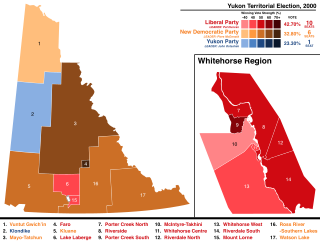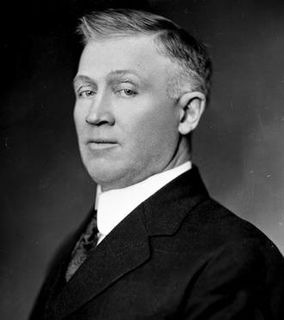
The Yukon Party is a conservative political party in Yukon, Canada. It is the successor to the Yukon Progressive Conservative Party.

The Yukon Legislative Assembly is the legislative assembly for Yukon, Canada. The Yukon Legislative Assembly is the only legislature in Canada's three federal territories which is organized along political party lines. In Nunavut and the Northwest Territories, the legislative assemblies are instead elected on a non-partisan consensus government model.

The Yukon general election of 2000 was held on April 17, 2000 to elect members of the Yukon Legislative Assembly in the Yukon Territory in Canada. The incumbent NDP government was defeated by the Liberal Party who formed a majority government
The 1909 Yukon general election was held on 28 June 1909 to elect the ten members of the Yukon Territorial Council. The council was non-partisan and had merely an advisory role to the federally appointed Commissioner. The 1909 election marked the first time that voters in the territory elected the entire council — in the four prior elections, the council was composed of five elected representatives and five representatives appointed by the Canadian federal government.

The 1978 Yukon general election, held on November 20, 1978, was the first conventional legislative election in the history of Canada's Yukon Territory. Prior elections were held to elect representatives to the Yukon Territorial Council, a non-partisan body that acted in an advisory role to the Commissioner of the Yukon. Following the passage of the Yukon Elections Act in 1977, the 1978 election was the first time that voters in the Yukon elected representatives to the Yukon Legislative Assembly in an election organized along political party lines.
Richard Nerysoo is a territorial level politician from the Northwest Territories, Canada. He was a member of the Northwest Territories Legislature from 1979 to 1995 and served as the third Premier and Speaker.

Klondike is an electoral district which returns a member to the Legislative Assembly of Yukon in Canada. One of the Yukon's eight rural ridings, it is also the oldest riding in the Yukon, first established in 1905. The riding includes Dawson City and its environs, as well as Eagle Plains.
Watson Lake is an electoral district which returns a member to the Legislative Assembly of the Yukon Territory in Canada. The riding is one of the Yukon's eight rural ridings and is one of the oldest ridings in the Yukon.
This article provides a timeline of elections in Canada, including all the provincial, territorial and federal elections. The information starts from when each province was formed or entered the Confederation, and continues through to the present day.
The 1920 Yukon general election was held on February 25, 1920 to elect the three members of the Yukon Territorial Council. The number of councilors was reduced from ten in the previous election to three following the general decline in population since the Klondike Gold Rush. The council held an advisory role to the federally appointed Commissioner.
The 1922 Yukon general election was set to be held on September 11, 1922. The results of the election were known on August 12, 1922 when all three electoral districts returned members to the Yukon Territorial Council by acclamation. The council played an advisory role to the federally appointed Commissioner.
The 1970 Yukon general election was held on 8 September 1970 to elect the seven members of the Yukon Territorial Council. The council was non-partisan and had merely an advisory role to the federally appointed Commissioner. There were twenty-one candidates, and 5,152 out of a potential 7,700 electors voted, a turnout of 66.9%.
The 1974 Yukon general election was held on 7 October 1974 to elect the twelve members of the Yukon Territorial Council. The council consisted of 10 non-partisan and two members elected for the Yukon NDP. It had merely an advisory role to the federally appointed Commissioner for some departments, but had full responsibility for several departments through the appointment of three councillors to an executive committee.
The 1905 Yukon general election was held on 12 April 1905 to elect five of the ten members of the Yukon Territorial Council. The Yukon Liberals and Conservatives fought the election on fully defined party lines for the first time in Yukon history.
The 1903 Yukon general election was held on January 13, 1903. The council was expanded to elect five of the ten members to the Yukon Territorial Council. The election was fought along party lines even though the council was limited in its powers and played an advisory role to the federally appointed Commissioner.
The Independent Alliance Party was a political party in the Canadian territory of Yukon that split from the Yukon Party in June 1991. The two original members were Bea Firth and Alan Nordling, both former members of the Yukon Party.
Mayo was an electoral district which returned an MLA to the Legislative Assembly of the Yukon Territory in Canada. It was created in 1928, at a time when it was one of three districts who elected advisors to the Yukon Territorial Council. The more contemporary, final iteration of the riding was created from an amalgamation of the riding with part of the riding of Klondike. It was abolished in 1992 when it was amalgamated with the riding of Tatchun to form the riding of Mayo-Tatchun.






